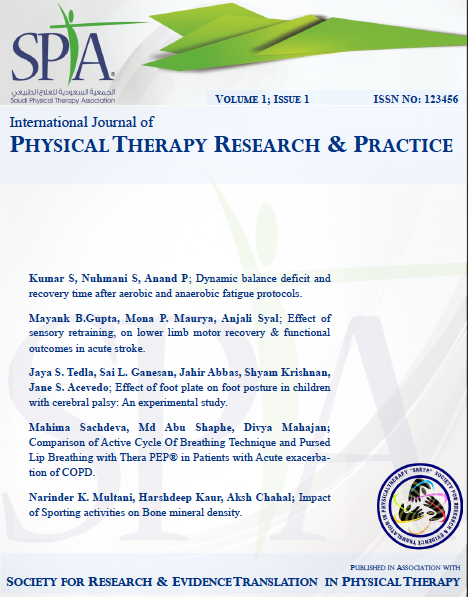Review Process
The International Journal of Physical Therapy Research & Practice (IJOPRP) is committed to ensuring that all published research meets the highest standards of scientific integrity, transparency, and ethical conduct. To achieve this, we employ a rigorous double-blind peer review system, guided by the principles of the International Committee of Medical Journal Editors (ICMJE), the Committee on Publication Ethics (COPE), and the World Association of Medical Editors (WAME).
1. Peer Review Model
- IJOPRP operates a double-blind review system, meaning both authors and reviewers remain anonymous throughout the process.
- This model minimizes conscious and unconscious bias, ensuring that manuscripts are assessed solely on their scientific quality, originality, and relevance to physical therapy research and practice.
2. Initial Editorial Screening
- All submitted manuscripts undergo preliminary screening by the editorial office to check for:
- Scope alignment
- Compliance with author guidelines
- Ethical approval statements (for human/animal studies)
- Plagiarism detection (using plagiarism-checking software)
- Manuscripts that fail to meet these requirements may be rejected without external peer review (desk rejection).
3. Reviewer Selection and Invitation
- Reviewers are selected based on their subject expertise, research experience, and publication record.
- Editors avoid selecting reviewers with potential conflicts of interest, including financial, personal, or professional relationships with the authors or their institutions.
- Reviewer invitations include clear information about expectations, confidentiality, and ethical obligations (COPE Ethical Guidelines for Peer Reviewers).
4. Reviewer Responsibilities
Reviewers play a crucial role in safeguarding the integrity of the scholarly record. They are expected to:
- Provide constructive, fair, and timely evaluations of the manuscript.
- Assess originality, methodology, clarity, ethical compliance, and contribution to the field.
- Suggest improvements that enhance scientific quality and readability.
- Respect confidentiality: Manuscripts must not be shared, discussed, or used for personal research.
- Report any suspected misconduct, including plagiarism, data manipulation, duplicate submission, or unethical research practices.
- Disclose any conflicts of interest and decline reviews where impartiality cannot be maintained.
5. Editorial Decision-Making
- Each manuscript is typically reviewed by at least two independent experts.
- The Editor-in-Chief or Section Editor makes the final decision, considering both reviewer reports and the journal’s editorial standards.
- Possible decisions include:
- Accept without revision
- Accept with minor revisions
- Revise and resubmit (major revisions)
- Reject
- Authors are given the opportunity to respond to reviewer comments and provide a detailed point-by-point rebuttal.
6. Revision and Resubmission
- Revised manuscripts must address all reviewer and editorial comments.
- Authors should provide a clear response letter explaining how each comment was addressed, with tracked changes where necessary.
- Revised manuscripts may be re-evaluated by the original reviewers or by new reviewers if required.
7. Appeals and Complaints
- Authors who disagree with an editorial decision may submit a formal appeal with justification.
- Appeals are reviewed by the Editor-in-Chief, and in complex cases, an independent reviewer may be consulted.
- Complaints regarding peer review ethics, editorial conduct, or publication bias are investigated according to COPE Core Practices.
8. Confidentiality and Anonymity
- All manuscripts under review are treated as confidential documents.
- Reviewer identities remain anonymous, unless reviewers choose to disclose themselves voluntarily.
- Editorial communications, reviewer comments, and author responses are archived to ensure accountability and transparency.
9. Integrity and Transparency
- IJOPTRP is committed to maintaining a transparent peer review process.
- Editorial and reviewer decisions are documented and traceable.
- The journal employs plagiarism-detection software, statistical review (where applicable), and may request raw data or ethics approval documentation.
- In cases of ethical breaches, IJOPTRP follows COPE guidelines to issue corrections, expressions of concern, or retractions.
References
- International Committee of Medical Journal Editors (ICMJE). Recommendations for the Conduct, Reporting, Editing, and Publication of Scholarly Work in Medical Journals. Updated 2024. Available from: http://www.icmje.org/recommendations/
- Committee on Publication Ethics (COPE). COPE Core Practices. Available from: https://publicationethics.org/core-practices
- COPE Council. Ethical Guidelines for Peer Reviewers. Committee on Publication Ethics. 2017. Available from: https://publicationethics.org/peerreview
- World Association of Medical Editors (WAME). Policy Statements: Responsibilities of Editors and Peer Reviewers.Available from: https://wame.org/policies



